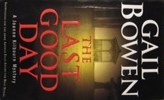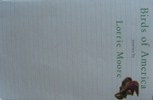Gail Bowen, The Last Good Day

I was looking for a fun weekend afternoon read and grabbed this off the to-read shelf. I think I got it from a pile of books my mom was discarding. (Free!)
I really wanted to like this book. The narrator sounded cool (55yo female university professor/amateur sleuth). It’s set in Saskatchewan! I don’t think I’ve ever read a book set in Saskatchewan that wasn’t CanLit. And the reviews on the back cover are glowing: “a treat from first page to final paragraph” (Globe & Mail), “Bowen is a national treasure” (Ottawa Citizen), etc. Apparently it was also shortlisted for the Arthur Ellis Award for best novel.
Really?! Did we read the same book? Because I actually thought it was really bad. I love Canadianisms as much as the next Canadian, but some of the CanCon here seemed soooo deliberate. Like, “Hey, I think I’ll stick in a priest with a West Indies accent (even though said character doesn’t actually have a speaking role—or a name, for that matter) because, aykb, Canada’s a multicultural society!” Or the completely random mention of a character carrying a Zeller’s bag. (Groan.)
[digression] Been thinking about this, because I think this is an important thing to remember when writing fiction. Random mentions feel like you’re working off a checklist (or namedropping). Stuff should have a reason for being there. If you’re going to mention a priest with a West Indies accent (interesting detail), then he should play a role in the story (he doesn’t). If you’re going to mention a Zeller’s bag (rather than a plain old plastic bag), then the fact it’s a Zeller’s bag should be significant (it isn’t). OTOH, the references to the RCMP felt perfectly natural, because there was a legitimate reason for them to be there. Good lesson here I think. I know I’ve been guilty of no-reason namedropping. But I think it’s important to note that it’s not just brand names—any detail can come across as awkward if it stands out and doesn’t serve a purpose. [/digression]
It was also excessively telly. Early in the book, a character dies. The narrator has been acquainted with this person for less than 24 hours, and has had exactly one 10-minute conversation with him (in which he confides his deepest, darkest secret — and… can I just say, unrealistic much? — yes, I always go around confiding my intimate secrets to complete strangers). Anyhow, after he dies, narrator goes on and on and on about how shattered she was by his death. Now granted, she witnessed his car driving into a lake and attempted a rescue (hint: it’s easier to break a window in a sinking car than to try to open a door!), so that would be somewhat disturbing. But she didn’t know the guy. The significance that the narrator kept saying this had on her seemed all out of proportion with what we had been shown of these characters.
The telliness also meant the characters were flat and uninteresting. There were a lot of characters, but none of them were fleshed out. Nobody felt real. The “Winners’ Circle” was annoying (I mean, honestly. On principle, who wouldn’t hate a group of law school students who named themselves the Winners’ Circle and still referred to themselves by that name 25 years later? How irritating must they be?). I couldn’t work up an iota of sympathy for these people.
The inciting incident basically made no sense. A work-related transgression (by guy who dies early in book) was blown out of proportion by a character who we don’t actually get to know first-hand (making the reasoning behind what she did in response to her discovery even less understandable). And then his reaction (driving his car into a lake, amongst other things) to that is also way beyond realistic.
But here’s the thing that drove me absolutely batty: this book was published in 2004. In the book, the characters are happily using email and have GPS in their cars. So, it is set in present day. However, when they are told that a character has moved to Vancouver to work at a law firm there, but are suspicious as to whether this is true or not, not one person thinks to use Google to check out the story. Isn’t that the first thing you would do? I mean, all medium-to-large law firms have websites! Generally with all the lawyers listed. Now, granted, some small ones don’t. But then there’s also the Law Society website, which lists all practicing and non-practicing lawyers in the province! Seriously, this story would take like two minutes to check out. I just could not get past this.
Maybe the characters couldn’t either, as they seemed inclined to take themselves out. Yes, the number of suicides (3*) in this novel outnumber the murders (1). So not only was it a frustrating read (Gooooooogle!), it was also depressing. Not exactly what I look for in a mystery. (ymmv, of course. I could not find one negative review of this book, so I am definitely in the minority.)
*Technically, that includes a murder-suicide, but as it was a pact between the two individuals, it was essentially a double-suicide.








